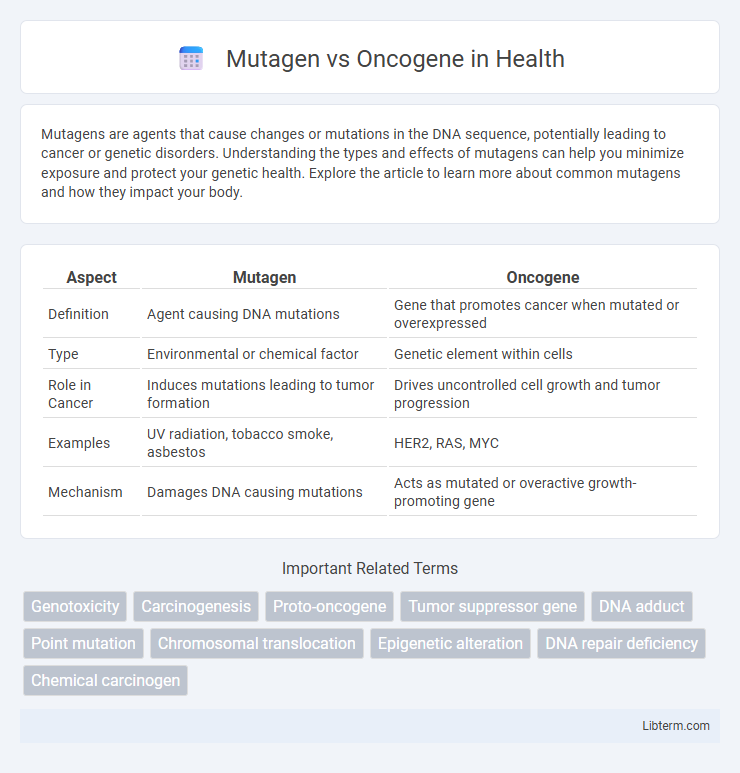Mutagens are agents that cause changes or mutations in the DNA sequence, potentially leading to cancer or genetic disorders. Understanding the types and effects of mutagens can help you minimize exposure and protect your genetic health. Explore the article to learn more about common mutagens and how they impact your body.
Table of Comparison
| Aspect | Mutagen | Oncogene |
|---|---|---|
| Definition | Agent causing DNA mutations | Gene that promotes cancer when mutated or overexpressed |
| Type | Environmental or chemical factor | Genetic element within cells |
| Role in Cancer | Induces mutations leading to tumor formation | Drives uncontrolled cell growth and tumor progression |
| Examples | UV radiation, tobacco smoke, asbestos | HER2, RAS, MYC |
| Mechanism | Damages DNA causing mutations | Acts as mutated or overactive growth-promoting gene |
Introduction to Mutagens and Oncogenes
Mutagens are agents such as chemicals, radiation, or viruses that induce mutations in DNA, potentially leading to genetic alterations. Oncogenes are mutated or overexpressed versions of normal genes (proto-oncogenes) that drive uncontrolled cell growth and contribute to cancer development. Understanding the role of mutagens in activating oncogenes is critical for cancer research and prevention strategies.
Defining Mutagens: Agents of Genetic Change
Mutagens are physical, chemical, or biological agents that induce genetic mutations by altering the DNA sequence, increasing the likelihood of genetic variation or damage. These agents include ultraviolet radiation, certain chemicals like benzene, and viruses that can integrate into the genome and disrupt normal gene function. Unlike oncogenes, which are mutated or overexpressed genes that drive cancer progression, mutagens act as external factors triggering genetic changes that may lead to oncogene activation or tumor suppressor gene inactivation.
Understanding Oncogenes: Drivers of Cancer
Oncogenes are mutated or overexpressed versions of normal genes called proto-oncogenes, which regulate cell growth and division. These genetic alterations lead to uncontrolled cellular proliferation, making oncogenes critical drivers of cancer development. Unlike mutagens, which are agents causing DNA damage or mutations, oncogenes specifically refer to genes whose activation directly contributes to tumorigenesis.
How Mutagens Induce Genetic Mutations
Mutagens induce genetic mutations by causing alterations in the DNA sequence through various mechanisms such as base substitutions, insertions, deletions, or chromosomal rearrangements. These agents, including chemical mutagens, radiation, and environmental toxins, disrupt the normal DNA replication process, leading to permanent genetic changes. Unlike oncogenes, which are mutated or overexpressed genes that drive cancer progression, mutagens act as external factors initiating mutations that can activate oncogenes or inactivate tumor suppressor genes.
Mechanisms of Oncogene Activation
Oncogene activation primarily occurs through genetic mutations such as point mutations, gene amplification, and chromosomal translocations that lead to increased or constitutive oncoprotein activity driving uncontrolled cell proliferation. Mutagens induce these genetic alterations by damaging DNA, thereby initiating oncogenic transformation through mechanisms like base substitutions, insertions, deletions, and double-strand breaks. The gain-of-function mutations in proto-oncogenes convert them into oncogenes, promoting oncogenesis by disrupting normal regulatory pathways in cell growth and apoptosis.
Relationship Between Mutagens and Oncogenes
Mutagens are agents that induce genetic mutations by altering DNA sequences, which can activate proto-oncogenes into oncogenes, driving uncontrolled cell proliferation and cancer development. Oncogenes originate from normal genes but become cancer-promoting through mutations often triggered by exposure to mutagens such as UV radiation, chemicals, or viruses. Understanding the relationship between mutagens and oncogenes is crucial for cancer prevention and therapeutic strategies targeting mutation-induced oncogene activation.
Types of Mutagens: Chemical, Physical, and Biological
Mutagens are agents that cause genetic mutations, categorized into chemical, physical, and biological types. Chemical mutagens include alkylating agents and base analogs that alter DNA structure or replication fidelity. Physical mutagens such as UV rays and ionizing radiation induce DNA strand breaks and crosslinks, while biological mutagens encompass viruses like HPV that integrate oncogenes into host genomes, potentially triggering oncogene activation and cancer development.
Examples of Oncogenes in Human Cancers
Oncogenes are mutated or overexpressed versions of normal genes (proto-oncogenes) that drive uncontrolled cell proliferation in human cancers. Prominent examples include the *HER2* gene in breast cancer, *KRAS* in pancreatic and colorectal cancers, and *BCR-ABL* fusion gene in chronic myeloid leukemia. Mutagen exposure can induce mutations in these genes, contributing to oncogenesis by altering key signaling pathways such as MAPK and PI3K/AKT.
Prevention and Control: Reducing Exposure to Mutagens
Minimizing exposure to mutagens, such as ultraviolet radiation, tobacco smoke, and certain chemicals, plays a crucial role in preventing DNA mutations that may activate oncogenes and trigger cancer development. Implementing safety measures, including using protective clothing, avoiding carcinogenic substances, and maintaining a healthy lifestyle, can significantly reduce mutagen-induced genetic damage. Regular screening and public education on environmental mutagens support early detection and effective control of oncogene-related malignancies.
Therapeutic Approaches Targeting Oncogenes
Therapeutic approaches targeting oncogenes primarily involve small molecule inhibitors and monoclonal antibodies designed to block the activity of proteins encoded by mutated or amplified oncogenes, such as EGFR or HER2. RNA interference and CRISPR-Cas9 gene editing techniques offer promising strategies to specifically silence or correct oncogene expression at the genetic level. Precision medicine leverages genomic profiling to tailor treatments that inhibit oncogenic signaling pathways, improving efficacy and reducing off-target effects compared to conventional chemotherapy.
Mutagen Infographic

 libterm.com
libterm.com